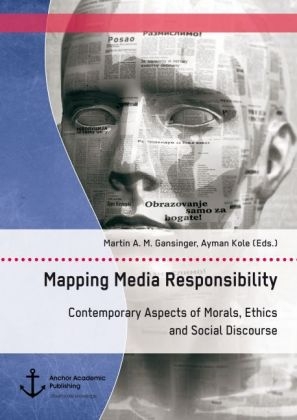
Mapping Media Responsibility. Contemporary Aspects of Morals, Ethics and Social Discourse
Anchor Academic Publishing (Verlag)
978-3-96067-134-3 (ISBN)
Dr. Martin Abdel Matin Gansinger (born 1979 in Austria) studied Communication Science and Political Science at the University of Vienna and is Assistant Professor and Head of Department/Radio, TV & Cinema at Girne American University. He published works on social dimensions and extemporaneous aspects of Free Jazz and HipHop as well as traditional knowledge systems, conducting field research on the Bobo Shanti Rasta Mansion and the Naqshbandi Sufi Order in Ghana, Morocco and Cyprus.
Dr. Ayman Kole (born 1980, Sydney, Australia) is Assistant Professor and Head of Social Media department at Girne American University. He completed his BA and MA at the University of Sydney, and has a PhD from Charles Sturt University. He is the author of the Phoenix Journal finalist 'The Mirror' and the historical novel 'Mark of the Crescent'. His fields include Literature, Media, Creative Writing, and Cultural studies of Eastern Europe, the Middle East, Turkey and Cyprus.
Text Sample:
The US Surveillance System:
Modern nation states use various mechanisms through which centralized authority is created and reproduced. In the Unites States, the FBI, the NSA and affiliate internet service-based organizations have come to embody the control structures of the government. These organizations collect and store personal data and relevant information from various sources. Surveillance and the collection of personal information raise morality issues. Research shows that information gathered is often used to interfere with individual autonomy and decision making rather than for the stated lawful purposes (Wicker & Schrader, 2011). Although the impression is often given that data collected is meant for public service purposes like national security, monitoring taxation, payment of salaries and pensions, medical records etc., social data gathered is becoming frequently used for other purposes. Social statistics have become increasingly gathered for the sake of control and for serving state purposes (Whitaker, 1999). Whitaker likens statistical information as 'handles' for controlling the citizenry. The processes of data mining, storage and exploitation are facilitated through the establishment of state structures or apparatuses.
The NSA by ist very title which contains the words 'security' and 'agency' connotes an organization established to secure government interests from external and internal agents, thus evoking suspicion and fear. The agency's ability to speedily present records of phone and social media activities, e-mail, bank account details, medical and other personal data as evidence - often against so called 'people of interest' - is evidence of ist immense surveillance scope and power. The Snowden disclosures prove that NSA literally and meticulously monitors the communications of individuals around the world. This atmosphere of surveillance thus helps to reinforce the US government's power and control over the public.
Operations in surveillance structures are secretive in nature as they concern sensitive information, therefore absolute care is required to manage all data. Strict compliance to administrative ethics and regulations by staff is often demanded. Hornberger (2014) notes that the very essence of the NSA is immoral and unethical as ist activities are conducted in secret. The numerous illegal and immoral activities of the NSA are often covered up by government. The power of the surveillance state rests on ist extensive knowledge about the society and where likely noncompliance is likely to occur (Whitaker, 1999). Compliance to the professional ethics of the state is often the requirement for promotion and rewards.
The surveillance state gives no room for personal morality. The secretive nature of the NSA with strict ethical codes makes whistleblowing a very daunting and dangerous act. Edwards (2013) states that in surveillance structures whistleblowers are viewed as enemies and saboteurs of the system. By deciding to blow the whistle, Snowden placed personal morality above organizational ethics, thus daring and dangerously confronting a surveillance structure. Snowden's disclosures are a direct challenge and exposé of state control apparatuses.
Whistleblowing: An Organizational Ethics Perspective:
Whistleblowing is an important subject that appears in a variety of fields such as engineering, defense, medicine, and law, to mention but a few. The term whistleblowing conveys a variety of meanings and approaches. For the purpose of this paper, whistleblowing is examined from the perspective of organizational ethics. Whistleblowing describes a process in which an employee/former employee discloses unethical practices or activities of his or her employer/former employer. These unethical practices include activities which threaten the safety, health and well-being of other staff, customers or entire public. Martin and Schinzinger (2005) stated that whistleblowing occurs when an employe
| Erscheinungsdatum | 13.04.2017 |
|---|---|
| Sprache | englisch |
| Maße | 155 x 220 mm |
| Gewicht | 325 g |
| Themenwelt | Sozialwissenschaften ► Kommunikation / Medien ► Allgemeines / Lexika |
| Sozialwissenschaften ► Kommunikation / Medien ► Medienwissenschaft | |
| Schlagworte | Aslan, Reza • Belorussian Cinema • Discursive Space • Islam in Western Media • Justice in Russia • madrasas • Media Ethics • National Development • New York Times • Orientalism • plagiarism • Press in Nigeria • Snowden, Edward • Social Responsibility • Whistleblowing |
| ISBN-10 | 3-96067-134-2 / 3960671342 |
| ISBN-13 | 978-3-96067-134-3 / 9783960671343 |
| Zustand | Neuware |
| Haben Sie eine Frage zum Produkt? |
aus dem Bereich


